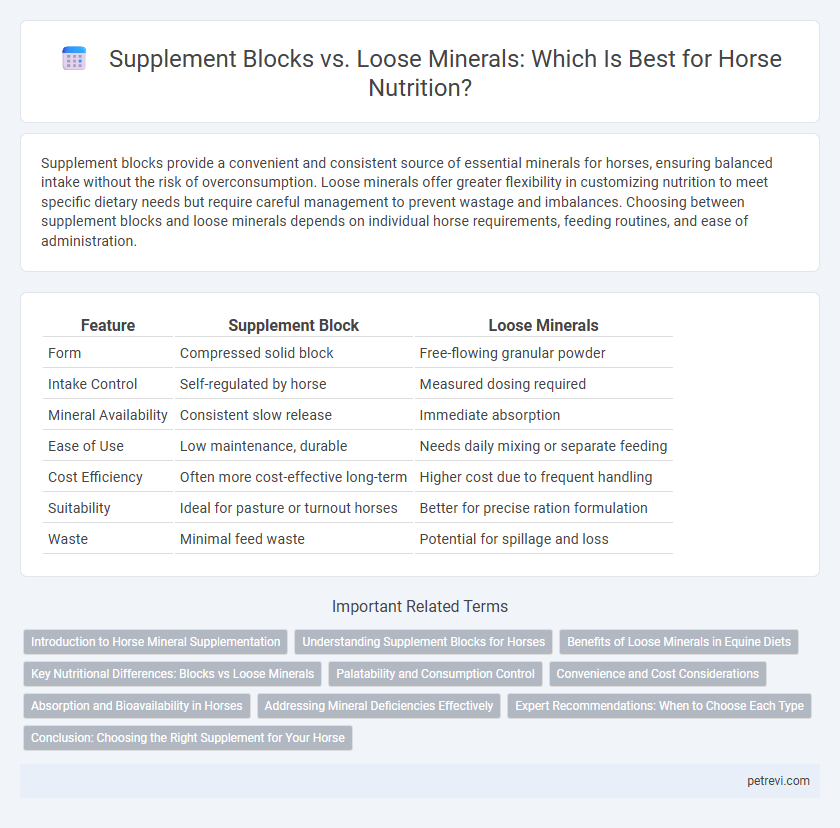Supplement blocks provide a convenient and consistent source of essential minerals for horses, ensuring balanced intake without the risk of overconsumption. Loose minerals offer greater flexibility in customizing nutrition to meet specific dietary needs but require careful management to prevent wastage and imbalances. Choosing between supplement blocks and loose minerals depends on individual horse requirements, feeding routines, and ease of administration.
Table of Comparison
| Feature | Supplement Block | Loose Minerals |
|---|---|---|
| Form | Compressed solid block | Free-flowing granular powder |
| Intake Control | Self-regulated by horse | Measured dosing required |
| Mineral Availability | Consistent slow release | Immediate absorption |
| Ease of Use | Low maintenance, durable | Needs daily mixing or separate feeding |
| Cost Efficiency | Often more cost-effective long-term | Higher cost due to frequent handling |
| Suitability | Ideal for pasture or turnout horses | Better for precise ration formulation |
| Waste | Minimal feed waste | Potential for spillage and loss |
Introduction to Horse Mineral Supplementation
Horse mineral supplementation is essential for maintaining optimal health, performance, and metabolic functions. Supplement blocks offer a controlled intake of essential minerals such as calcium, phosphorus, and trace elements, ensuring consistent nutrient delivery. Loose minerals provide flexibility in dosage adjustment, allowing precise formulation to meet individual horse dietary requirements.
Understanding Supplement Blocks for Horses
Supplement blocks for horses provide a convenient and consistent source of essential minerals and vitamins, promoting optimal nutrient intake without the risk of overfeeding. These blocks are designed to slowly dissolve as the horse licks, ensuring controlled consumption that adapts to the animal's needs. Unlike loose minerals, supplement blocks reduce wastage and contamination, making them a practical choice for maintaining balanced equine nutrition.
Benefits of Loose Minerals in Equine Diets
Loose minerals offer superior bioavailability compared to supplement blocks, enabling horses to self-regulate intake based on individual nutritional needs. This form promotes better digestion and absorption of essential trace minerals such as zinc, copper, and selenium, which support immune function, hoof health, and coat quality. Equine diets supplemented with loose minerals often result in improved overall health and performance due to enhanced mineral balance and reduced wastage.
Key Nutritional Differences: Blocks vs Loose Minerals
Supplement blocks for horse nutrition offer a controlled intake of essential minerals like calcium, phosphorus, and trace elements, providing a consistent and balanced nutrient supply that minimizes wastage and ensures uniform consumption. Loose minerals allow for customizable blends tailored to specific dietary needs, enhancing bioavailability and enabling precise nutritional adjustments based on horse activity levels and forage quality. Key differences include the ease of intake regulation in blocks versus the flexibility and rapid absorption potential provided by loose minerals, impacting overall equine health and performance.
Palatability and Consumption Control
Supplement blocks for horses offer consistent intake and improved palatability, ensuring stable mineral consumption tailored to equine dietary needs. Loose minerals allow flexible dosing but often face challenges with uneven consumption and reduced palatability, risking nutrient imbalances. Controlled consumption through blocks supports targeted nutrition management, enhancing horse health and performance.
Convenience and Cost Considerations
Supplement blocks offer convenience by providing a controlled, slow-release source of essential minerals, reducing the need for frequent supplementation and minimizing waste. Loose minerals allow more precise customization of nutrient intake based on the horse's specific dietary needs but may require daily monitoring and mixing, increasing labor time. Cost-wise, supplement blocks often present a more economical option due to reduced waste and labor, while loose minerals can be more expensive but beneficial for horses with specialized nutritional requirements.
Absorption and Bioavailability in Horses
Supplement blocks provide a controlled intake of essential minerals but may result in variable absorption rates depending on the horse's licking behavior and saliva production. Loose minerals offer higher bioavailability due to direct consumption and quicker intestinal absorption, enhancing nutrient uptake and utilization. Optimal horse nutrition benefits from loose mineral supplementation to ensure consistent bioavailability and effective absorption, supporting overall equine health and performance.
Addressing Mineral Deficiencies Effectively
Supplement blocks provide controlled, slow-release mineral delivery, ensuring horses consistently consume essential nutrients like sodium, calcium, and trace elements to address deficiencies effectively. Loose minerals offer flexible dosing and can be customized to specific dietary needs, promoting precise correction of mineral imbalances in horse nutrition. Choosing the right format depends on the horse's consumption habits, forage quality, and targeted mineral supplementation goals.
Expert Recommendations: When to Choose Each Type
Experts recommend selecting supplement blocks for horses requiring consistent, controlled intake of minerals and electrolytes, especially in pasture settings where free-choice access is preferred. Loose minerals are advised for horses with specific dietary needs or when precise dosage adjustments are necessary, such as during illness or intense training periods. Veterinarians and equine nutritionists emphasize balancing calcium, phosphorus, and trace minerals based on forage analysis to optimize horse health and performance.
Conclusion: Choosing the Right Supplement for Your Horse
Selecting the appropriate supplement block or loose minerals depends on your horse's specific nutritional needs and feeding routine. Supplement blocks provide convenience and controlled intake, ideal for easy management and consistent mineral consumption. Loose minerals offer flexibility in dosage and can be precisely tailored to address individual deficiencies or performance requirements.
Supplement Block vs Loose Minerals for Horse Nutrition Infographic

 petrevi.com
petrevi.com